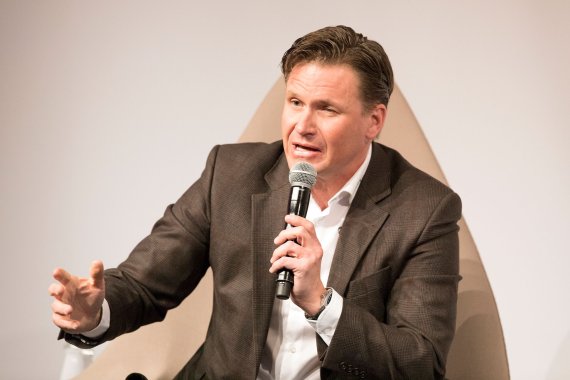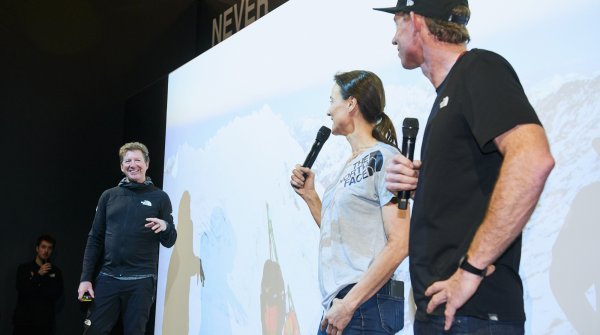
ISPO.com: Mr. Lehmann, how well does skiing market itself?
Urs Lehmann: I think a lot of good things have been done in the past. This is why skiing and snow sports generally have a good reputation. But we urgently need to take one, if not two, steps forward now to live up to the new media and the whole of digitalization - otherwise we will effectively be overtaken on the right.
Especially in ski racing new competition formats are under discussion. Tell me about it.
On one side there is already the parallel slalom, on the other side the alpine combination of downhill and slalom is to be abolished. But also the question is whether we need a revolution, or whether it is simply a matter of putting many small building blocks together again in a slightly different and optimized way.
I also watch other sports and what I like about them is how Formula E does it so well. How it integrates the spectators, be it with votes or features, how the spectators can virtually sit in the car online while the race is running and virtually ride along, so to speak. This is madness - and it's doable!
A few years ago there was a game called "Ski-Challenge": a huge boom! That's what the boys played - most of the time there are older people sitting in front of the TV. If you can now link the digitalization with the races, then we'll get the younger ones back. There's still a lot of potential there.
How open is the World Ski Federation FIS to such ideas? Or who else would have to push such a development?
The FIS should be doing that. But too little happens in this respect. I keep talking to FIS President Gian Franco Kasper, and I have the feeling that he sees it the same way - but nothing happens in his organization.
With his 75 years he is just another generation...
That's a good point. But I do see working groups with technicians who are supposed to talk about marketing - that's not possible! This is a very big topic, keyword potential.
How exhausted is the standard in TV broadcasts of the races?
When I look at this in Austria and Switzerland, it is already on a very high level. But there's a lot more you can do. An example: On the Lauberhorn descent in Wengen there is a key point, the so-called Kernen-S. There, the entry and exit speed of the racer is measured: This is what the viewer understands and wants to know!
There are a lot of small gadgets you could use more. Or: How far does a jump go, for example the Hundschopf in Wengen, the Kamelbuvkel in Val Gardena or the Mausefalle in Kitzbühel? That's not a technical problem, no witchcraft - and that impresses people. I don't understand why you haven't done this ten years.
Instead, there are tens of different parallel formats...
It's okay to consider parallel slalom as an innovation, but we can't have three different formats: City event, parallel slalom and parallel giant slalom. No one, not even I, knows exactly how the three differentiate themselves - how should the audience understand that?
If we can learn something for example from biathlon: It has to be easy to understand for the viewer at home on television, also for someone from Northern Germany who watches two ski races a year and otherwise football. And if he becomes a fan, then we win.
Top 10: These Are the Most Popular Athletes on Instagram
Even the points system is not accessible to everyone.
Correct, we have three point systems that don't mesh. In tennis there is a world ranking, the Grand Slams, the 1000s and the smaller tournaments. For skiers there is the World Cup. There are 30 World Cup points for the first 30 and FIS points for all others. There is no link to the European Cup races, but there are also FIS points after the first 30th race.
Such a mess: That simply does not work. We need a coherent, permeable system across the stages World Cup, European Cup and FIS races. If, for example, as a convalescent, I could also collect points for the World Cup in the European Cup, I would start there first.
In the World Cup, I have to be among the top 15 again right away, in order not to fall out of my starting group, I have to take the risk of injuring myself again right away. Because if I don't have World Cup points, I'm in nirvana. European Cup races simply don't interest no one. As I said, what is needed is not a revolution, but a combination of optimized parts of the whole.
Apropos optimization: Is there any reason to fear that the Olympic Winter Games will soon have to be cancelled because there are no more organizers?
A lot has been done badly in the past - and now we're suffering from it. This 2020 Charter, which wants to move away from big events again, is actually only the consequence of the last 20 years. But the reputation is simply gone. Even in Switzerland we can't convince people. Big events cost billions: People no longer want that. But the IOC is in the process of turning the whole thing back.
Is that right?
There is at least the paper, the 2020 Charter. That's the paper, but if we don't have any organizers then...The Swiss application in Sion would really have been a "back to nature" statement. If we go to China, it's absolutely clear: This won't be a "back to the roots" event. That'll be a huge event, too. A very difficult situation to come back to a reasonable, really Olympic thought corresponding event.

 OutDoor by ISPOOutDoor in transition
OutDoor by ISPOOutDoor in transition
- Awards
- Mountain sports
- Bike
- Fitness
- Health
- ISPO Munich
- Running
- Brands
- Sustainability
- Olympia
- OutDoor
- Promotion
- Sports Business
- Textrends
- Triathlon
- Water sports
- Winter sports
- eSports
- SportsTech
- OutDoor by ISPO
- Heroes
- Transformation
- Sport Fashion
- Urban Culture
- Challenges of a CEO
- Trade fairs
- Sports
- Find the Balance
- Product reviews
- Newsletter Exclusive Area
- Magazine
























